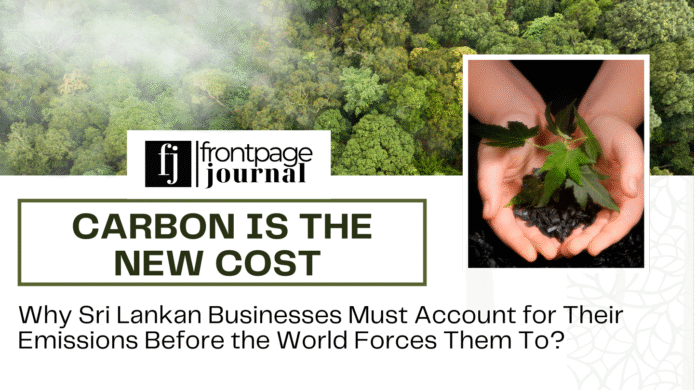As the global economy pivots toward climate accountability, carbon is rapidly emerging as a cost factor that businesses can no longer ignore. The old model of externalizing environmental impact and treating emissions as someone else’s problem is no longer viable in a world where markets, investors, and regulators are demanding transparency. For Sri Lankan businesses that rely on exports, global financing, or international partnerships, carbon accounting is no longer a forward-looking option. It is a competitive necessity.
Across Europe, North America, and Asia, regulators are tightening environmental standards. The European Union’s Carbon Border Adjustment Mechanism is just the beginning. It will apply a carbon cost on imported goods that do not meet the EU’s emissions benchmarks. Sectors such as iron, steel, aluminium, cement, fertilizers, and electricity are already under scrutiny, but more categories will follow. Exporters of textiles, ceramics, processed food, packaging, and light engineering from Sri Lanka are next in line. Without verifiable emissions data and reduction plans, companies will face either financial penalties or outright exclusion from high-value markets.
At the same time, global investors are shifting their capital toward companies that demonstrate carbon consciousness. Environmental, Social, and Governance (ESG) metrics are now embedded in due diligence processes of institutional investors, private equity funds, and development finance institutions. Climate risk is being priced into loans, insurance premiums, and shareholder expectations. Businesses that delay emissions tracking may find themselves facing higher capital costs or missing out on ESG-linked investment altogether.
Proactive carbon accounting begins with a comprehensive footprint audit. This involves measuring Scope 1 emissions from direct operations, Scope 2 from purchased energy, and Scope 3 from the entire value chain. For many companies, especially in agriculture, apparel, and logistics, Scope 3 can be the largest and most complex. But complexity is not a reason for inaction. Tools like the Greenhouse Gas Protocol and ISO 14064 offer standardized frameworks to help companies measure, report, and reduce emissions credibly.
Sri Lanka’s manufacturing sector stands at a unique advantage. Many local factories already operate on lower emissions compared to larger regional competitors due to smaller scales, hydropower reliance, and manual processes. However, these benefits are invisible unless measured and disclosed. A carbon audit transforms these silent advantages into certified value that can be communicated to buyers, investors, and regulators. It turns environmental performance into a strategic asset.
Moreover, companies that begin carbon disclosure early can shape the narrative rather than be shaped by it. They can identify hotspots, reduce operational inefficiencies, optimize energy use, and plan clean technology investments with greater confidence. Early action also allows firms to influence supplier behavior, build transparent reporting systems, and train internal teams in sustainability practices before external mandates arrive.
For the Sri Lankan private sector, this is a moment to lead. Industry associations and chambers must encourage member companies to begin carbon tracking, develop shared databases, and lobby for national incentives that reward decarbonization. Government agencies should assist exporters with technical support, digital tools, and access to international certification standards. Financial institutions can offer green loans tied to emissions targets, helping businesses invest in renewable energy, process upgrades, and waste reduction systems.
There is also a branding opportunity. In a global market where consumers are seeking ethical, sustainable, and low-carbon products, companies that disclose and reduce their carbon footprint can command a premium. Sri Lanka can position itself not just as a producer but as a sustainability leader. Carbon transparency enhances credibility and differentiates products in categories where price competition is high.
The cost of carbon is not just a line on a future invoice. It is already embedded in risk, reputation, and resilience. The companies that understand this will move now to integrate carbon accounting into their core strategy. They will not wait for the world to impose costs. They will treat emissions as their own responsibility and turn compliance into advantage.
In the coming years, carbon will be measured, taxed, and traded with the same intensity as any other economic asset. Businesses that do not prepare will be caught unready in a system that punishes opacity. But those that act early will lead the transition, shape industry standards, and earn the trust of a world that is no longer tolerant of environmental ambiguity. The cost of carbon is rising. The cost of delay is higher. The time to act is now.




